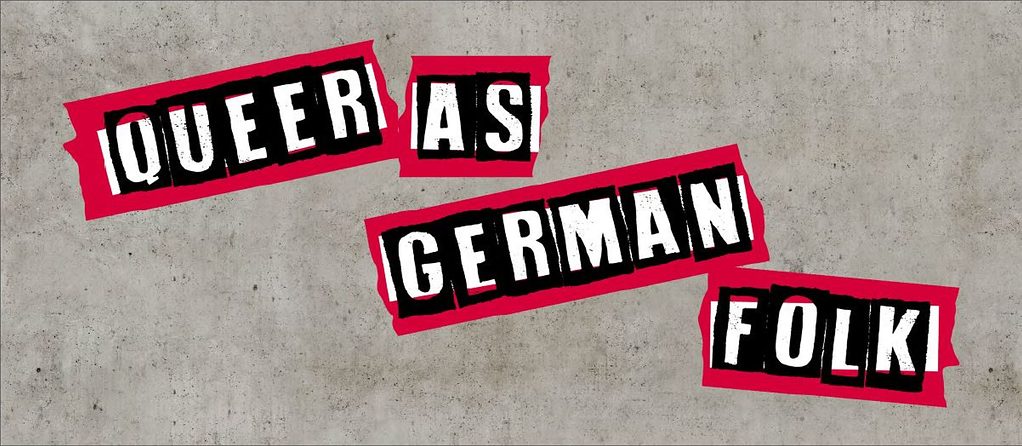
On May 23, 2019, join the Goethe-Institut Washington and The DC Center for the LGBT Community in celebrating the opening evening of Queer as German Folk: an innovative punk, activism, and DIY-inspired project that synthesizes local and German narratives on the constant crusade for queer equality and achieving queer civil rights throughout the last half-century.
Here in Washington, the main feature of the Queer as German Folk project is a joint exhibition hosted by the Goethe-Institut Washington and The DC Center for the LGBT Community (May 23 – August 23). These two partners, along with the Schwules Museum Berlin, have collaborated to develop a unique exploratory gallery experience in the form of a remixed, interactive, hands-on deconstructed archive where visitors can browse at their own pace and according to their own interests. The installation consists of two major elements: the first being a set of materials developed together with Berlin-based curators Birgit Bosold and Carina Klugbauer of the Schwules Museum Berlin, and the second being a set of materials selected by up-and-coming local curator Mary Claire Phillips, who has meticulously sifted through Washington-based archives and other partner resources to find artifacts that best highlight some of the most special facets of the LGBTQ+ community in Washington. The duality of the installation will display the queer history in both Germany and the Washington, DC area alike, presenting the parallels and divergences in the fights for equality that continue in each place. Contributors to the local component of the exhibit include The DC Center for the LGBT Community, The Rainbow History Project,
Whitman-Walker Health, local photographer Elvert Barnes, and the DC Public Library.
The DC Center for the LGBT Community will host a portion of the exhibit, which will be available for viewing beginning on May 23 M-F from 12:00 pm to 6:00 pm, with a special guided opening tours through the Center available at 5:00 pm and again at 5:30 pm. Following the opening at the DC Center, a self-guided tour featuring Washington landmarks of special significance to queer history in the city will lead guests to the Goethe-Institut Washington (1990 K St. NW, Ste. 03, 20th St. entrance) at 6:30 pm. There, the opening reception will have light refreshments and a talk with the local curator, Mary Claire Phillips.
From May 11 to August 23, the multi-partner film series Kino-Q will take place at multiple venues across the DC area, including the Goethe-Institut, showcasing films of cultural and historic importance to the LGBTQ+ community and narrative. Films from Germany, Canada, Mexico, and the United States will be screened and paired with expert-led discussions about their significance and relevance today. All films and programming will be presented in English or with English subtitles.
On June 22 at 8:00 pm, the Goethe-Institut will host Cabaret on K, a Weimar Germany-inspired cabaret show and party that underscores the intersections between Berlin as a center of queer culture in the 1920s and DC’s modern queer nightlife. The evening will feature performances of authentic cabaret music, drag performances, and burlesque performances. Fifty years ago, in 1969, the Stonewall Uprising in New York City launched the modern queer rights movement in the United States and around the world. In response to violence and discrimination against queer people – among them many people of color, drag queens, trans people, women, and sex workers – this act of resistance highlighted a turning point in the struggle for social justice and equality for queer people across the globe.
Queer as German Folk takes the fiftieth anniversary of Stonewall as an opportunity to outline the current state of discourse on queer emancipation against the backdrop of the past half-century. With a focus on adjusting historical perspectives and questioning the dominance and hegemony of the traditional cis-male narrative, the project – consisting of a dual-location exhibition, a film series, and an event series, all developed alongside local partners in the Washington, DC area – will put a special spotlight on the transatlantic dialogue between Germany and North America throughout history. The Goethe-Instituts Montreal, Toronto, Chicago, New York, San
Francisco, and Mexico City, as well as the Goethe-Center Guadalajara, are all participating with exhibition openings and programming in the summer of 2019. Each city will specifically examine the historical and cultural exchanges between Germany and the local community of that city.
For more information and inquiries, contact Raleigh Joyner at Raleigh.Joyner@goethe.de.
